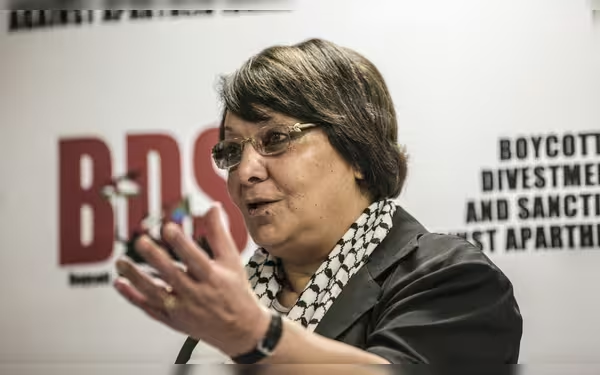Sunday, October 6, 2024 12:24 AM
South Africa Mulls Street Renaming After Leila Khaled
- Johannesburg considers honoring Leila Khaled with street name.
- Proposal sparks controversy among political parties and communities.
- Debate reflects broader geopolitical tensions and historical grievances.
 Image Credits: arabnewspk
Image Credits: arabnewspkJohannesburg debates renaming a street after Leila Khaled, igniting political controversy and reflecting historical grievances.
In a move that has ignited a heated debate, officials in Johannesburg, South Africa's largest city, are considering renaming a prominent street after Leila Khaled, a Palestinian woman known for her involvement in hijacking incidents over 50 years ago. This proposal has drawn sharp criticism from various political parties and the local Jewish community, highlighting the complexities surrounding historical narratives and contemporary political issues.
Leila Khaled, now 80 years old, became infamous in 1969 when she participated in the hijacking of a Trans World Airlines flight traveling from Rome to Tel Aviv, Israel. This act made her the first woman to hijack a plane. The following year, she was also involved in an attempt to hijack an Israeli Airlines flight from Amsterdam to New York City, which ended tragically with the death of one of the hijackers at the hands of air marshals. While Israel labels Khaled a terrorist, many Palestinians and supporters of their cause view her as a hero and a freedom fighter.
The proposal to rename the street, located in Johannesburg's financial district of Sandton, was initially put forward by Al Jamaah, a pro-Palestinian minority party. It has since garnered support from the African National Congress (ANC), South Africa's ruling party. This controversy is not new; it first emerged in 2018 and reportedly led to a brawl among city officials, showcasing the deep divisions within the local political landscape.
South Africa has a long history of solidarity with the Palestinian cause, often criticizing Israel for its actions in Gaza. The country has accused Israel of committing genocide, a claim that is currently being examined by the International Court of Justice. This backdrop adds another layer of complexity to the street renaming debate, as it reflects broader geopolitical tensions and historical grievances.
As the Johannesburg city council deliberates on this proposal, it raises important questions about how societies remember and honor historical figures. Should a person’s actions, viewed through the lens of time, be celebrated or condemned? The decision to rename a street after Khaled could serve as a powerful statement about South Africa's stance on the Israeli-Palestinian conflict, but it also risks alienating segments of the population who view her actions as terrorism.
The discussion surrounding the potential renaming of a street after Leila Khaled is emblematic of the ongoing struggle to reconcile historical narratives with contemporary values. It serves as a reminder that history is often viewed through different lenses, and the choices made today can have lasting implications for future generations. As this debate unfolds, it will be crucial for all parties involved to engage in constructive dialogue, fostering understanding rather than division.













